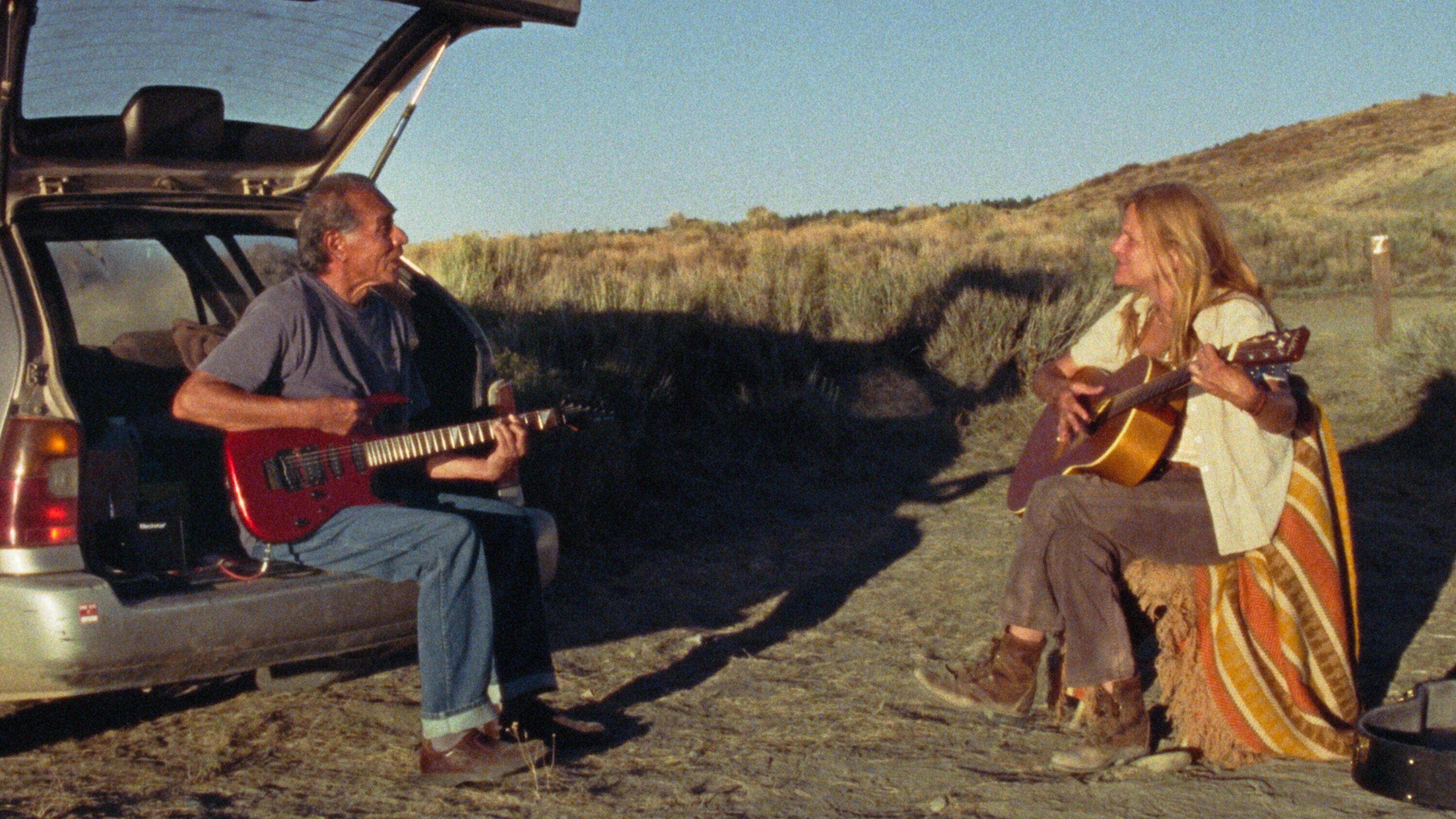A LOVE SONG
**** Historically cast for their hard-bitten gravitas, Wes Studi (The Last of the Mohicans, Hostiles) and Dale Dickey (Winter’s Bone, Leave No Trace) boast well over 200 screen credits between them. But freshman director Max Walker-Silverman is the first filmmaker to find romantic vulnerability in the grooves of Dickey’s and Studi’s unforgettable visages. A Love Song finds Faye (Dickey) idling away at a Southwestern Colorado campground, awaiting a letter from high-school friend Lito (Studi). With some Moonrise Kingdom-influenced camerawork, the film is a playful exercise in simplicity, as Faye catches crawdads, cracks Busch Lights, and spins the dial on her lightly magical radio, which always plays the perfect lonesome country tune. When Studi arrives, the movie becomes a sublime two-part harmony—both actors wear their age as armor, delicately juxtaposing late-stage puppy love with their characters’ very real fear of starting over after age 60. More akin to a short story than a novel, the movie is a mere 81 minutes, but in every dusty frame, it features some of 2022′s finest acting. PG. CHANCE-SOLEM-PFEIFER. Living Room.
FREE CHOL SOO LEE
*** The title of Chol Soo Lee’s prison memoir is Freedom Without Justice. The war between those two concepts defined the prisoner-turned-activist’s life and turned him into a tragic emblem, an evolution bracingly captured by this documentary from directors Julie Ha and Eugene Yi. Lee’s wrongful imprisonment for murder in San Francisco in 1973 (and its decades of fallout) epitomizes the dehumanization of Asian Americans at its most systemically glaring. Channeling the spirit of Sacramento Bee reporter K.W. Lee, who first led the charge for Chol Soo’s exoneration, Ha and Yi embrace detailed reportage, demonstrating the racially biased bunglings of police and judicial procedure. While a grassroots Asian American movement builds to free him, we hear the incarcerated Chol Soo Lee keenly observing how prison is designed to alienate him even from those who’ve given their lives to his case. The film could benefit from a slightly wider lens or deeper final act—Lee himself says the real heroes are the other activists, but the focus is almost entirely on him, showing how freedom without justice torments even a man who’s become iconic. That approach may be transformative, but it can’t restore what was stolen. PG-13. CHANCE-SOLEM PFEIFER. Wednesday, Aug. 17, at Clackamas, Lloyd Center, Pioneer Place.
ANONYMOUS CLUB
** Ever since she burst upon the indie rock scene nearly 10 years ago, Courtney Barnett has presented herself as a smart, taciturn, down-to-earth artist, prodigious at channeling mental health struggles into lyrics while shredding left-handed. All those terrific qualities are confirmed—softly and needlessly—in this documentary by music video director Danny Cohen. Through three years of 16 mm touring footage and confessional dictaphone recording, we witness Barnett plumb the existential value of her songwriting, battle writer’s block, and embark on her first solo tour, but none of these decidedly uncinematic ideas necessitates a documentary. With Barnett, what you see is what you get. She’s not someone whose myth needs to be built or deconstructed, and Cohen doesn’t have a distinct vision for the film beyond creating a downbeat tour diary with a pleasant, analog aesthetic. While it’s mildly amusing to glimpse the closest thing to a modern rock-’n’-roll star sensibly watering her plants and stretching before shows, Anonymous Club’s self-mandate to pull back the curtain just appears ill-conceived. “Why can’t you just be a strong, powerful communicator?” Barnett asks herself at a moment of stinging self-doubt about her ability to publicly unpack her music. Does she need to? She’s one of songwriting’s best communicators. That’s more than enough. NR. CHANCE SOLEM PFEIFER. Friday, Aug. 19, at Cinema 21 with Courtney Barnett in person.
CLAYDREAM
** “Interesting characters often have a simple goal…but it’s in great conflict with the world around them,” narrates the late, legendary Portland animator Will Vinton in ClayDream, a documentary about his life. Thematically, it’s a perfectly chosen quote, but it also spotlights the film’s limits. ClayDream frames a pioneering creator primarily as a combatant—against Phil Knight (to whom he lost his company), against Bob Gardiner (his former collaborator-turned-tormentor), against his own flawed business acumen, and even against the introspection necessary to make this documentary really resonate. Seen here, Vinton’s self-analyses are so matter of fact they’re almost expository (like that his 1985 film The Adventures of Mark Twain represented a “high bar” or that the California Raisins were a “really successful project”). He’s portrayed more as a being in perpetual motion than as someone whose imagination can be unpacked. Granted, that appears accurate, according to the many interviews conducted by director Marq Evans (who also made The Glamour & the Squalor about another Pacific Northwest institution, Seattle DJ Marco Collins), but it leaves frustration behind. The film’s most cogent narrative is of a business’s rise and fall, set to ominous courtroom-drama music. ClayDream is a melancholic Vinton primer that capably chronicles what they made at Will Vinton Studios, just not why. NR. CHANCE SOLEM-PFEIFER. Cinema 21.

